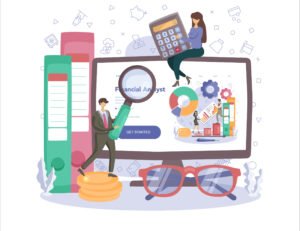Introduction
In today’s digital workplace, Microsoft Excel has become one of the most important tools for professionals across industries. Far beyond simple spreadsheets, Excel is a powerful application for data-driven decision-making, financial analysis, reporting, and productivity. Whether you’re a student, a fresh graduate, or a working professional, Advanced Excel course can significantly enhance your career prospects. Employers consistently look for candidates who can manage data, analyze trends, and simplify workflows—and Excel plays a critical role in all of these tasks.
In this blog, we will explore why Excel is a career-defining skill, the key Excel skills every professional must learn, how Excel mastery contributes to career growth, industries that rely heavily on Excel, and the best ways to learn Excel effectively.

Why Excel is a Career-Defining Skill
Excel isn’t just software; it’s an essential workplace language understood worldwide.
Excel as a Universal Workplace Tool
From finance to marketing, human resources to data analysis, Excel is used across industries for reporting, budgeting, scheduling, and managing large sets of data. Its adaptability makes it relevant to almost every professional role.
Boosting Productivity and Efficiency
With formulas, shortcuts, and automation features, Excel helps professionals save hours of manual work. Instead of spending time on repetitive tasks, employees can focus on problem-solving and decision-making.
Demand for Excel Skills in the Job Market
Today, Excel proficiency is often a baseline requirement in job postings. Recruiters view Excel as a must-have skill, and candidates with advanced Excel course knowledge instantly stand out, increasing their chances of securing better roles.
Key Excel Skills Every Professional Should Master
To grow in your career, mastering specific Excel skills is essential.
Formulas and Functions
Core formulas like SUM, VLOOKUP, HLOOKUP, IF, and COUNTIF are fundamental for handling data efficiently. These functions allow professionals to perform calculations, comparisons, and logical operations quickly.
Data Analysis Tools
Excel’s PivotTables, charts, and filtering tools transform raw data into meaningful insights. Professionals can analyze customer trends, financial data, or performance metrics with just a few clicks.
Excel Automation with Macros
Macros simplify repetitive tasks by automating processes. Even a basic understanding of macros can save hours of work, making you more productive and valuable to employers.
Data Visualization
Visual elements like conditional formatting, graphs, and interactive dashboards help present data in an understandable way. Professionals who can communicate insights visually are often preferred in decision-making roles.

How Excel Course Translates into Career Growth
Excel mastery is not just about skills—it’s about creating opportunities.
Excel as a Gateway to Analytics
Learning Excel lays the foundation for advanced tools like Power BI, SQL, and Python. Many data analysts and business intelligence professionals begin their journey with Excel.
Better Decision-Making
Managers and executives rely on Excel for tracking KPIs, budgets, and business performance. Employees who can manage and present such data gain trust and influence in their organizations.
Career Advancement Opportunities
Professionals with advanced Excel skills often qualify for promotions, leadership roles, and higher salaries. Excel mastery signals that you are detail-oriented, analytical, and ready to take on responsibility.
Industries Where Excel Mastery is Highly Valued
While Excel is universal, certain industries depend on it heavily.
Finance & Accounting
Used for budgeting, auditing, and forecasting, Excel is a backbone for finance professionals.
Marketing & Sales
Helps track customer data, campaign performance, and sales trends with ease.
Human Resources
From payroll to employee performance tracking, HR professionals rely on Excel for data management.
Operations & Administration
Excel supports inventory management, scheduling, and operational reporting, making it critical for smooth business functioning.
How to Learn and Master Excel Effectively
Building Excel mastery requires the right resources and consistent practice.
Online & Offline Training Options
Enroll in structured Excel courses to build strong foundations. Institutions like Sharada Academy in Mangalore provide professional Excel training tailored for career growth.
Practice-Based Learning
Learning Excel is most effective when applied to real-world projects—budget sheets, reports, and dashboards. The more you practice, the more confident you become.
Staying Updated with New Features
Microsoft regularly updates Excel with features like Power Query, data models, and enhanced visualization tools. Staying updated ensures your skills remain relevant in a changing job market.
Conclusion
Excel is no longer just a spreadsheet tool; it is a career accelerator. From boosting productivity to unlocking leadership opportunities, Excel mastery can set you apart in today’s competitive job market. If you’re serious about growing in your career, enrolling in an Advanced Excel Course should be a top priority.
At Sharada Academy in Mangalore, you can learn Excel through practical, hands-on training designed to help you apply skills in real-world scenarios. Don’t just learn Excel—master it with our Advanced Excel Course, and unlock the career opportunities waiting for you.
FAQs
What are the basic Excel skills I should start with?
Start with core formulas like SUM, IF, and VLOOKUP, along with basic charts, formatting, sorting, and filtering. These give you a strong foundation before moving on to advanced tools like PivotTables.
Is Excel still relevant in 2025 with new software tools?
Yes, Excel is still widely used in 2025. It integrates with modern tools like Power BI and SQL, making it both versatile and future-proof for workplaces.
How long does it take to master Excel?
Basic skills can be learned in a few weeks, while advanced features like macros and data analysis may take a few months of consistent practice.
Do I need Excel certification for career growth?
Certification isn’t mandatory, but it adds credibility to your resume and can give you an advantage in job applications and promotions.
Can Excel skills help me if I’m not in finance or accounting?
Definitely. Excel is valuable in marketing, HR, operations, administration, and research—not just finance. Its versatility makes it useful in almost every profession.






